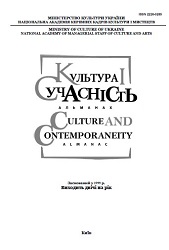Соціальний статус у сучасній міжкультурній комунікації
Social Status in the Modern Intercultural Communications
Author(s): Iryna Yanivna Kanyukova, Evgeniya Anatoliyivna SidorovskayaSubject(s): Culture and social structure , Theory of Communication, Sociology of Culture
Published by: Національна академія керівних кадрів культури і мистецтв
Keywords: social status; social role; social prestige; intercultural communication; etiquette;
Summary/Abstract: The purpose of the article is to theorize the features of the communicative process in accordance with the social status of the individual and identify its specifics in the context of cross-cultural communication. Research methodology. A typological method was used to identify the characteristic features of social status; method of system analysis and synthesis, as well as the method of culturological analysis, which contributed to the consideration of social status as an important factor in the culture of communication in general and intercultural communication in particular, etc. Scientific novelty. The social status of the individual is studied and its components (career, income, lifestyle, age, etc.) are analyzed in the context of influencing the features of intracultural and intercultural communicative process; features of selfidentification of social status by representatives of different countries are revealed; features of language etiquette as a functional-semantic universal in the context of marking social relations established within the communicative process are considered; the correspondence of the level of intercultural communication to the social role and social prestige of the individual is clarified. Conclusions. Social status as a concept and phenomenon combines the most important socio-economic and socio-psychological characteristics. In the process of intercultural communication, social status, together with the absolute and relative ratios of age, gender, degree of closeness, tone of communication or the degree of adherence to etiquette norms of communicators are among the factors influencing the choice of communication. The study found that the level and features of the communicative act in the process of intercultural communication are most influenced by socio-psychological aspects, such as social role and social prestige. Self-identification of social status in different countries has national-specific features and directly depends on social prestige (for example, Americans and Ukrainians) and the social system (British). In the XXI century. Due to the dynamic intensification of international contacts, communication between representatives of different cultures and social statuses is intensified, which, in the context of interpenetration and mutual adaptation of cultural norms and standards of behavior, affects the transformation of etiquette norms of interethnic communication. At the present stage, the representation of the social status of the individual in the context of self-expression and the formation of their own identity plays an important role. Some elements of inter-cultural communication become part of the image of the individual, so he can change the perception of belonging to a certain social status, forming the necessary perception of the interlocutor.
Journal: Культура і сучасність
- Issue Year: 2022
- Issue No: 1
- Page Range: 56-61
- Page Count: 6
- Language: Ukrainian

